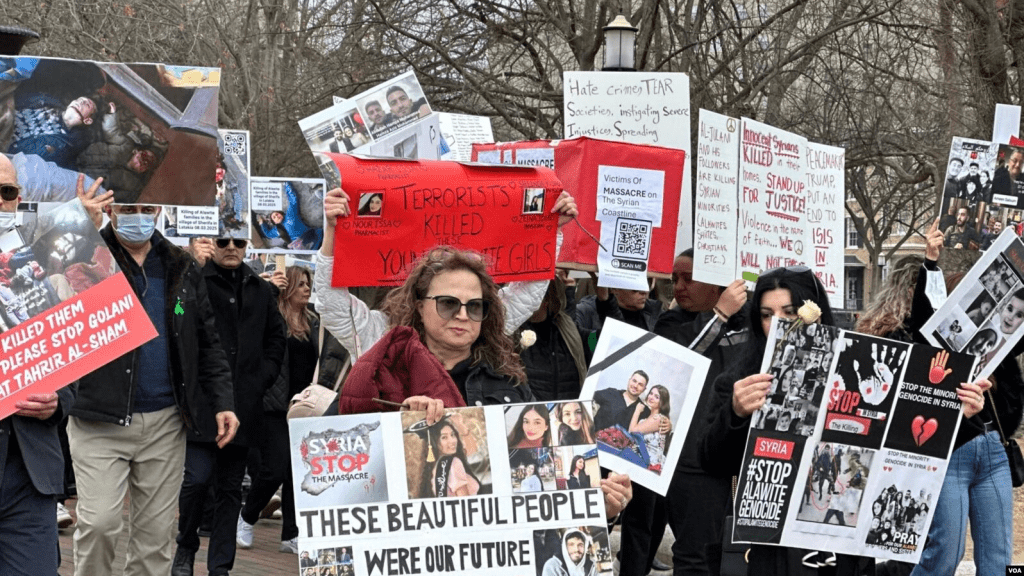Syria: UN blames state and pro-Assad forces for March violence

Protest against the massacre of Syria's Alawites, May 2025
A UN commission investigating interethnic violence in Syria’s Alawite-dominated areas has concluded that pro-government security forces, as well as fighters loyal to the Assad regime, were behind killings that took place in March, according to The National on August 14th.
The massacres occurred in Syria’s western provinces of Latakia and Tartus, where state security forces and allies were accused of conducting summary executions, primarily targeting civilians from the Alawite religious minority.
According to a report published on August 14th by the UN Syria Commission of Inquiry, around 1,400 people, mostly civilians, were reported killed in the violence, with allegations of abuses continuing.
Syria’s Foreign Minister Assad Al-Shibani said his government “deeply appreciates” efforts by the commission, saying that they take “serious note” of the reported violations committed in a letter to the inquiry’s chairman. Al-Shibani added that his government’s investigations are still underway.
US Special Envoy to Syria Tom Barrack labelled the report a “serious step”. He affirmed that “a united, inclusive Syria requires justice pursued consistently and some cadenced patience from the outside world.”
The UN report called the violence conducted by “members of the interim government forces and private individuals operating alongside or in proximity to them … followed a systematic pattern across multiple, widespread locations”. It even claimed that “the violations included acts that likely amount to war crimes.”
The commission recorded instances of “murder, torture, and mistreatment of the dead, along with extensive looting and the burning of homes, all of which displaced tens of thousands of civilians”.
Meanwhile, human rights groups and global organisations have said families, including women, children and elderly people, were killed. The report outlined cases in which men were identified as members of the Alawi sect and then separated from women and children to be taken outside and shot. These instances were in line with the individual testimonies documented by the media after the bloodshed.
The outbreak of violence was sparked after forces loyal to former President Bashar al-Assad and his Ba’athist regime launched a lethal ambush on government troops carrying out an arrest operation in Latakia on March 6th, the report said. Additional attacks occurred as the government responded by deploying about 200,000 military reinforcements to Latakia, Tartus, and surrounding areas. The same UN commission previously warned that the country is facing levels of violence not seen since 2020.
President Assad’s authoritarian regime enjoyed support from co-ethnic Alawites and other minority groups before his rule collapsed, following an offensive by Islamist-led rebel groups that ended Syria’s civil war.
However, incidents like those along the coast have cast doubt on the new government’s capacity to safeguard minority rights and handle sectarian tensions. Since Assad’s downfall, there has been an uptick of communal violence in Syria, such as mass killings of the Druze community in the southern province of Sweida by pro-government forces.
The UN commission said that it was granted “unfettered access” to the area by the provisional government and gathered findings based on over 200 interviews with survivors and witnesses. It stated that there are “reasonable grounds to believe” that security forces and others committed “serious violations of international human rights law.”
The inquiry’s chairman, Paulo Sergio Pinheiro, said: “The scale and brutality of the violence documented in our report is deeply disturbing.” He urged Syria’s new government to hold the perpetrators to account.
“While dozens of alleged perpetrators of violations have reportedly since been arrested, the scale of the violence documented in our report warrants expanding such efforts,” he added. The investigation is still ongoing as the commission still receives information about ongoing violations in these regions, such as abductions of women, arbitrary arrests and enforced disappearances.
Yet, the report said it had “found no evidence of a governmental policy or plan to carry out such attacks”, although the systematic nature of violence “in certain locations may be indicative of an organisational policy within certain factions of groups”.
Syria’s government welcomed the commission’s report, claiming that what was said was in line with the results of its own Independent National Fact-Finding Commission. The report by the national commission issued in July, found “serious violations against civilians on March 7th, 8th and 9th, including murder, premeditated murder, looting, destruction and burning of homes, torture and sectarian insults”.
It identified “the names of 1426 dead, including 90 women”, and 298 suspects involved in the violations linked to various military factions, along with 265 other suspects tied to he Assad regime.
The UN commission’s report was released amidst growing tensions between the Kurdish-led Syrian Democratic Forces (SDF) and the formerly-Islamist-dominated government. Following an SDF-hosted interethnic conference, with Alawite representatives in attendance, calling for federalism and minority rights guaranteed in a new constitution, the government withdrew from talks with the group in Paris.
The National, Maghrebi.org
Want to chase the pulse of North Africa?
Subscribe to receive our FREE weekly PDF magazine













